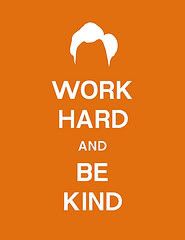A few days ago a friend and former classmate posted this article on Facebook and asked for open discussion.
 |
| Image and Article by Margaret Jacobsen |
This article resonated with me because I do happen to have a fascination and respect for African-American hair. There can be so much style, power, and expression in the way people of color wear their hair. Natural, relaxed, weaves, extensions, wigs, and lots more aspects that I have yet to educate myself on. (I also happen to have hair like straw, as the author describes some of the individuals she encounters.) But I don't just walk up to my friends and ask them to tell me about their hair. And I certainly don't just put my hands in their hair. So I've read articles, listened to podcasts, read books, and watch documentaries. For example, on the topic of black hair I listened to a Stuff Mom Never Told You podcast with Lori L. Tharpe you can find here. Lori L. Tharpe is co-author of Hair Story: Untangling the Roots of Black Hair in America.
I haven't gotten to read it yet, but it's on my (way too long) To-Read list. I also watched the documentary Good Hair. Admittedly, I was assigned to watch this doc in my Film & TV Analysis class, but it was already on my (also way too long) To-Watch list. If you are interested in this topic like I am, the documentary or the podcast is probably the quickest way to acquaint yourself with it and learn why when you ask a black woman, or man for that matter, about their hair, you are asking a whole lot more than you realize.
Making the effort to educate yourself can actually open up much more meaningful conversations with your friends. Saying, "I read this book/article/saw this movie/heard this interview and would like to know what you think," is much more effective than basically asking someone to educate you about some facet of their oppression. If you want to learn more about being a good ally to oppressed groups/individuals, check out the article 10 Common Things Well-Intentioned Allies Do That Are Actually Counterproductive on Everyday Feminism (Hint: we've been talking about #4 here).







1 comments:
I was just talking about something like this to a friend. I read an article by a white woman who had an African-American woman join her yoga class. In the article the author invented a scenario in her mind about this "heavy-set black woman" who obviously just came in to do some yoga. The author, who talked about wanting to help this poor woman, came up with elaborate assumptions about her based solely on race. Instead of helping out, the entire article was about this white woman's feelings. She went on a big long rant where she thought she had cracked some racial code, or something, and ended up in her house crying, or something.
The point I'm trying to make is that yes, sometimes when the majority has general curiosities, it can often come across as condescending, and completely ignorant, when they assume all minorities are alike based on television and their few experiences around them.
Post a Comment